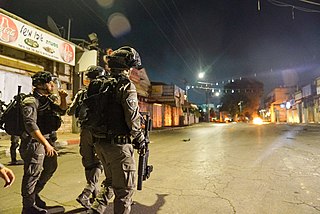Related Research Articles

Ashkelon or Ashqelon is a coastal city in the Southern District of Israel on the Mediterranean coast, 50 kilometres (30 mi) south of Tel Aviv, and 13 kilometres (8 mi) north of the border with the Gaza Strip.

The history of the Israeli–Palestinian conflict traces back to the late 19th century when Zionists sought to establish a homeland for the Jewish people in Ottoman-controlled Palestine, a region roughly corresponding to the Land of Israel in Jewish tradition. The Balfour Declaration of 1917, issued by the British government, endorsed the idea of a Jewish homeland in Palestine, which led to an influx of Jewish immigrants to the region. Following World War II and the Holocaust, international pressure mounted for the establishment of a Jewish state in Palestine, leading to the creation of Israel in 1948.

Jewish Voice for Peace is an American anti-Zionist left-wing Jewish advocacy organization that is critical of Israel's occupation of the Palestinian territories, and supports the Boycott, Divestment and Sanctions (BDS) campaign against Israel.

Palestinian political violence refers to actions carried out by Palestinians with the intent to achieve political objectives that can involve the use of force, some of which are considered acts of terrorism, and often carried out in the context of the Israeli–Palestinian conflict. Common objectives of political violence by Palestinian groups include self-determination in and sovereignty over all of Palestine, or the recognition of a Palestinian state inside the 1967 borders. This includes the objective of ending the Israeli occupation. More limited goals include the release of Palestinian prisoners held by Israel and recognition of the Palestinian right of return.

The state of human rights in the West Bank and Gaza Strip is determined by Palestinian as well as Israeli policies, which affect Palestinians in the occupied Palestinian territories both directly and indirectly, through their influence over the Palestinian Authority (PA). Based on The Economist Democracy Index this state is classified as an authoritarian regime.

The Arab–Israeli conflict is the phenomenon involving political tension, military conflicts, and other disputes between various Arab countries and Israel, which escalated during the 20th century. The roots of the Arab–Israeli conflict have been attributed to the support by Arab League member countries for the Palestinians, a fellow League member, in the ongoing Israeli–Palestinian conflict; this in turn has been attributed to the simultaneous rise of Zionism and Arab nationalism towards the end of the 19th century, though the two national movements had not clashed until the 1920s.

The Great Mosque of Gaza, also known as the Great Omari Mosque, was the largest and oldest mosque in all of Gaza, Palestine, located in Gaza City.

On 3 October 1980, a bomb exploded outside the Rue Copernic synagogue in the 16th arrondissement of Paris, France, during Shabbat services. Approximately 320 worshippers were inside the synagogue when the bomb went off outside, killing four people and wounding 46. It was the first deadly attack against Jews in France since the end of the Second World War.
Antisemitic incidents escalated worldwide in frequency and intensity during the Gaza War, and were widely considered to be a wave of reprisal attacks in response to the conflict.

Al-Hamma was a Palestinian Arab village in the Tiberias Subdistrict, 12 kilometres (7.5 mi) southeast of Tiberias. It was situated on a narrow salient in the Yarmouk Valley bounded by Syria to the north and Transjordan to the south and east. Al-Hamma was one of the stations on the Jezreel Valley railway, linking the Hejaz Railway to Haifa. It was depopulated twice, once in July 1949, and again between 1949 and 1956.

The Popular Front for the Liberation of Palestine is a secular Palestinian Marxist–Leninist and revolutionary socialist organization founded in 1967 by George Habash. It has consistently been the second-largest of the groups forming the Palestine Liberation Organization, the largest being Fatah.

The 2014 Gaza War, also known as Operation Protective Edge, and Battle of the Withered Grain, was a military operation launched by Israel on 8 July 2014 in the Gaza Strip, a Palestinian territory that has been governed by Hamas since 2007. Following the kidnapping and murder of three Israeli teenagers in the West Bank by Hamas-affiliated Palestinian militants, the Israel Defense Forces (IDF) initiated Operation Brother's Keeper, in which it killed 10 Palestinians, injured 130 and imprisoned more than 600. Hamas subsequently fired a greater number of rockets into Israel from the Gaza Strip, triggering a seven-week-long conflict between the two sides. It was one of the deadliest outbreaks of open conflict between Israel and the Palestinians in decades. The combination of Palestinian rocket attacks and Israeli airstrikes resulted in over two thousand deaths, the vast majority of which were Gazan Palestinians. This includes a total of six Israeli civilians who were killed as a result of the conflict.

Reactions to the 2014 Gaza War came from around the world.
"Khaybar, Khaybar, ya yahud! Jaish Muhammad soufa yaʿoud!" is an Arabic-language rallying slogan referencing the Battle of Khaybar of 628 CE, which began after Muhammad marched with a large Muslim army and besieged Khaybar, an oasis in present-day Saudi Arabia that was home to a notable Jewish community.
Antisemitism is a growing problem in 21st-century Germany.

The 2021 Gaza War, sometimes called the Unity Intifada, was a major outbreak of violence in the Israeli–Palestinian conflict that mainly commenced on 10 May 2021, and continued until a ceasefire came into effect on 21 May. It was marked by protests and police riot control, rocket attacks on Israel by Hamas and Palestinian Islamic Jihad (PIJ), and Israeli airstrikes in the Gaza Strip. The crisis was triggered on 6 May, when Palestinians in East Jerusalem began protesting over an anticipated decision of the Supreme Court of Israel on the eviction of six Palestinian families in the East Jerusalem neighborhood of Sheikh Jarrah. Under international law, the area, effectively annexed by Israel in 1980, is a part of the Israeli-occupied West Bank; On 7 May, according to Israel's Channel 12, Palestinians threw stones at Israeli police forces, who then stormed the Al-Aqsa Mosque compound using tear gas, rubber bullets, and stun grenades. The crisis prompted protests around the world as well as official reactions from world leaders.

The Israel–Hamas war has sparked protests, demonstrations, and vigils around the world. These events focused on a variety of issues related to the conflict, including demands for a ceasefire, an end to the Israeli blockade and occupation, return of Israeli hostages, protesting war crimes, and providing humanitarian aid to Gaza. Protests against Israeli action in Gaza were notably large across the Arab world. Since the war began on 7 October 2023, the death toll has exceeded 30,000.
Since 7 October 2023, numerous violent incidents prompted by the Hamas attack on Israel and the ensuing Israel–Hamas war have been reported worldwide. They have accompanied a sharp increase in global antisemitism and Islamophobia, as well as anti-Israeli sentiment and anti-Palestinian sentiment or broader anti-Arab sentiment. Other people and groups have also been targeted, such as the Sikhs, who are commonly mistaken to be Muslims by their attackers.
Following the Hamas-led attack on Israel on 7 October 2023 and the outbreak of the Israel–Hamas war, there has been a surge of antisemitism around the world. Israeli Immigration Minister Ofir Sofer has stated that Israel is bracing to expect a large wave of Jews migrating to Israel due to the rising antisemitism around the world.
Antisemitism in New Zealand is the manifestation of hostility, prejudice or discrimination against the New Zealand Jewish people or Judaism as a religious, ethnic or racial group. This form of racism has affected Jews since New Zealand's Jewish community was established in the 19th century.
References
- 1 2 3 Lapin, Andrew (2023-10-18). "Historic synagogue in Tunisia heavily damaged in rioting tied to Israel-Gaza war". Jewish Telegraphic Agency. Retrieved 23 October 2023.
- ↑ Axelrod, Toby (2011-03-06). "Tunisian Jews reportedly embrace revolution, don't fear Islamism". Jewish Telegraphic Agency. Retrieved 23 October 2023.
- ↑ Zaman, Amberin (2023-10-20). "Tunisia's Jews on edge after crowd torches synagogue amid Gaza protests". Al-Monitor. Retrieved 23 October 2023.